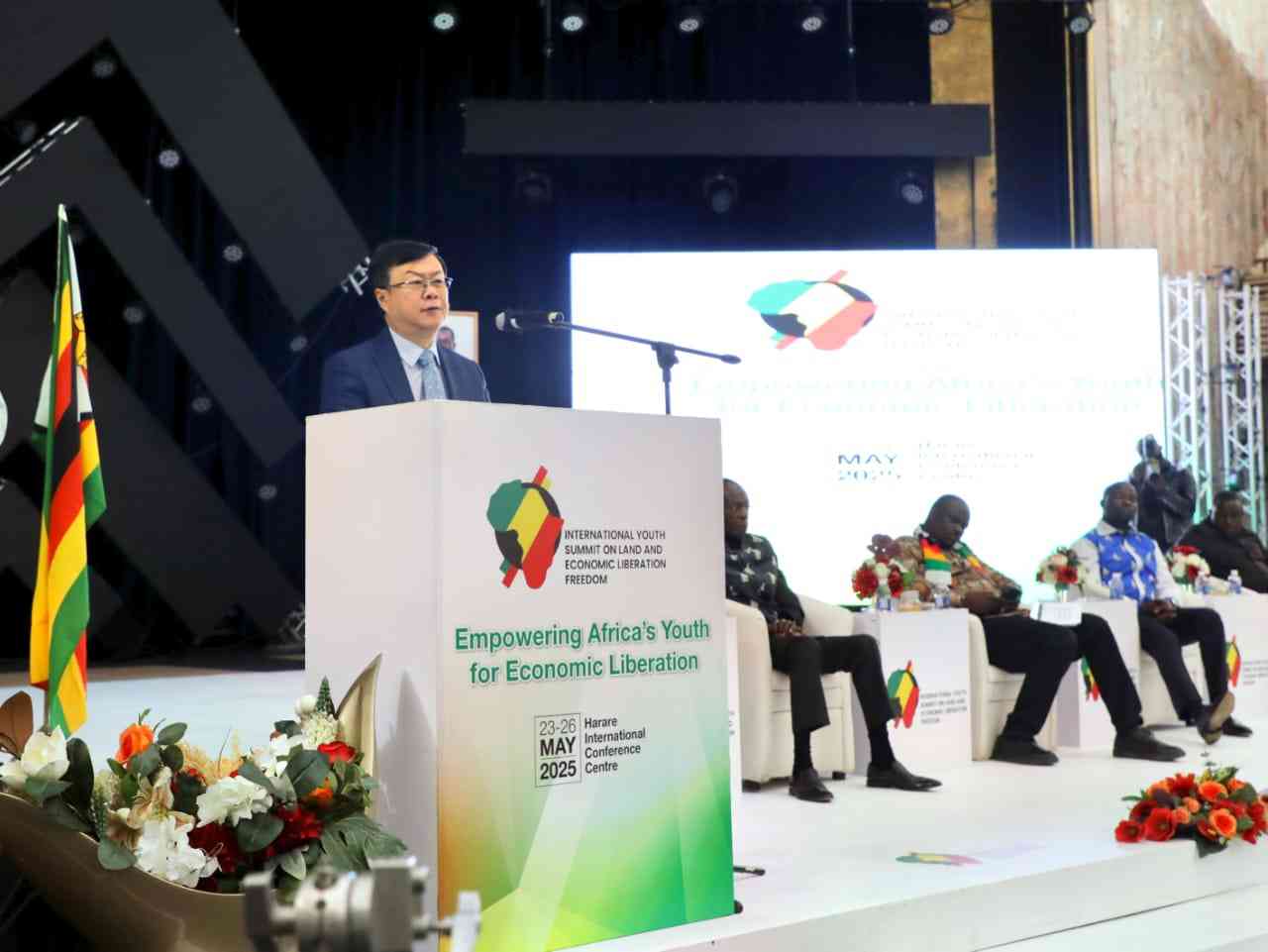
China’s partnership with Zimbabwe is translating into tangible progress for the country with trade between Beijing and Harare has soared to record levels, China’s ambassador to Zimbabwe Zhou Ding has said.
Addressing the International Youth Summit on Land and Economic Freedom, hosted by the Africa Youth Congress in Harare on Africa Day, Zhou said the China-Zimbabwe strategic partnership is the epitome of the broad China-Africa relations.
“For many years, China has been Zimbabwe's largest source of foreign investment and one of its most significant trading partners,” Zhou said.
“ Our bilateral trade volume reached a historic peak of 3.8 billion US dollars in 2024 — a 23.9% year-on-year increase.
“Chinese investments continue to grow. From the airports in Harare and Victoria Falls that connect Zimbabwe to the global markets, to the boreholes that bring clean water to rural villages; from the Hwange and Kariba South Power Stations that energise the national grid to the Dinson Steel Plant and Titan Energy Complex that boost industrial capacity of Zimbabwe; from medical teams that heal communities to agricultural experts that empower farmers, the China-Zimbabwe partnership proves that true development is not transactional, but transformational.”
Over the past three years, Chinese companies have helped create more than 1.1 million job opportunities in Africa, and our educational exchange programs have facilitated over 12,000 African students to study in China annually, the envoy said.
Zhou said since 2018, more than 3000 Zimbabwean students have studied in China. About 500 professionals from across sectors have participated in various training programmes in China each year.
“A number of Chinese top universities have partnered with renowned educational institutions here including the University of Zimbabwe, Harare Polytechnic Institute, to cultivate applied talents and professionals for Zimbabwe,” he added.
- Mavhunga puts DeMbare into Chibuku quarterfinals
- Bulls to charge into Zimbabwe gold stocks
- Ndiraya concerned as goals dry up
- Letters: How solar power is transforming African farms
Keep Reading
“Our partnership continues to complement the Zimbabwean government’s effort in attaining the goals of Heritage-Based Education 5.0.
“I am also pleased to note that in recent years, the Chinese companies here in Zimbabwe have invested more than 100 million US dollars in more than 70 community social responsibility projects, focusing on youth empowerment, poverty reduction and technology transfer. “
He said China stood ready to walk beside you as a partner, to empower the young generation in Africa to turn its potential into prosperity.
“This is why besides building critical infrastructure, China-Africa partnership has always prioritised job creation, knowledge transfer and human resources cooperation,” Zhou said.
The ambassador said China was also helping Zimbabwe to modernise its agriculture and was working with rural communities to transfer technology.
“With 60% of its population residing in rural areas, the growth of Zimbabwe’s agricultural sector is pivotal to the nation's modernisation,” Zhou said.
“Over the years, China has developed a highly productive and efficient modern agricultural system through technological innovation and institutional reforms.
“Today, China feeds 20% of the global population with just 7% of the world's arable land, making a significant contribution to global food security.
“Technology now accounts for over 60% of China’s agricultural development.
”Committed to sharing its agricultural technologies, expertise and experiences with African countries, China has long advocated dismantling technological monopolies to enhance food security across Africa.”
He said one exemplary initiative was the China-Zimbabwe Agricultural Cooperation Demonstration Village Project, which he described as a vivid illustration of how the partnership uplifts rural communities and improves rural livelihoods in Zimbabwe.
“In the demonstration Villages of both Mashonaland West and Mashonaland Central, the Chinese Agricultural Expert Group has not only installed critical infrastructures like solar-powered boreholes and irrigation systems, but has also introduced high-yield farming techniques, improved seed varieties, and efficient irrigation methods,” Zhou added.
“They have provided local communities with hands-on training in crop cultivation, vegetable farming and poultry breeding.
“The project is boosting farmers' yields, incomes, and hope and opportunities for youth and women, in the previously marginalized rural communities.
“Setting a benchmark for sustainable development, the Demonstration Village Project has been recognized as one of the best global practice in poverty reduction.”











